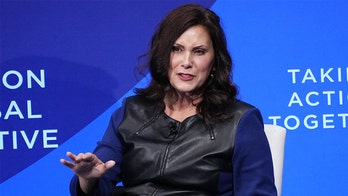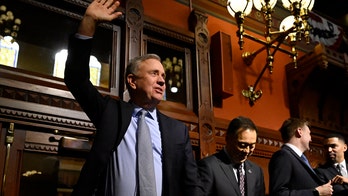They claim to be a grassroots movement, but critics call them astro-turf. In either case, the Tea Party movement is quickly shaking off its "greenness" to become a force that some coalition members contend is more effective than the Republican Party.
"This movement has done more to give conservatives a voice than the GOP has in the past eight years," said Dana Loesch, a conservative radio talk show host and member of the Nationwide Tea Party Coalition. "Republicans have been following the Tea Party's lead since February."
"I think it's fair to say this is not a Republican-sponsored movement," said Brendan Steinhauser,an organizer who described supporters as "conservatives, independents, and libertarians" concerned over the "size and scope of the government."
Tea Partiers got their start last fall as a disorganized bunch of disaffected voters who were furious about the Bush administration's Wall Street bailout. Then, Steinhauser said, these opponents of excessive government spending were pushed over the edge by President Obama's call for a $787 billion stimulus.
Using a dozen social networking sites to mobilize constituents opposed to big-government spending, the movement took root in February after a group of individuals used Twitter to react to CNBC on-air editor Rick Santelli's "rant," in which he accused the government of "promoting bad behavior" in regard to the Homeowners Affordability and Stability Plan, and raised the idea of a "Chicago Tea Party."
Since then, the movement has taken on issues far beyond taxes and spending, and has found it is able to mobilize mass responses in short order.
Movement organizers last week were quick to lash out against Obama's plan to speak directly to students in their first week of school, and the accompanying lesson plan drawn up by the White House.
Within hours of the White House's announcement, the Nationwide Tea Party Coalition launched a Web site called "Hall Pass on That," offering an alternative for students who did not wish to view the president's address.
The group called on school administrators to let students opt out of assignments requiring them to write letters about what they could do to "help the president." School districts like Lindburgh School District in St. Louis, Mo., chose not to broadcast the speech live after coalition members contacted school administrators to protest its viewing.
But it's that kind of influence that has some questioning the group's independence.
At first, Tea Partiers relied heavily upon social networking sites like Twitter, Facebook, and Ning to organize rallies quickly and efficiently and to raise money in all 50 states. But the movement is now spearheaded by an alliance of several conservative groups -- including FreedomWorks, Tea Party Patriots, Resistnet.com and the National Taxpayers Union.
Steinhauser is director of federal and state campaign for FreedomWorks, the non-profit organization founded in 1984 by former House Majority Leader Dick Armey. Counted on its board of directors is none less than entrepreneur and former Republican presidential candidate Steve Forbes.
FreedomWorks is now a central organizer getting out the message about Tea Party events, and has largely funded the rallies leading up to Saturday's march in Washington, D.C., where "tens of thousands" are expected to attend.
The march will be the culmination of a 34-city, 7,000 mile Tea Party Express bus tour that began Aug. 28 in Sacramento, Calif. And the Tea Partiers meet in D.C. with a message for Obama -- large-scale opposition to the current plans for a health care overhaul, among other policies, and a demand that health insurance reform create more competition and be guided by market principles, not a government-run plan.
"People on the right just typically don't protest," Steinhauser said of the rallies highlighting the Tea Party Express.
The Tea Partiers' opponents say the group is highly organized, but leaders in the movement disagree among themselves even about who is the leader, or whether there is one.
Steinhauser told FOXNews.com on Tuesday that the idea for a Sept. 12 march was his. But other activists insist there is no leader and that the movement is strictly a groundswell.
Conveying news and information about the Tea Party events also has an unruly quality about it. The movement has attracted the attention of popular conservative commentators like Rush Limbaugh and Glenn Beck as well as support from Democrats like New Hampshire state legislator Joel Winters, who is expected to speak at Saturday's mass rally in Washington.
But it also touts folk heroes like out-of-work, every-man "Joe the Plumber" as a draw to its rallies.
The White House has so far made little mention of the organized movement, and it declined to comment for this article. In an Aug. 4 off-camera briefing with reporters, White House Press Secretary Robert Gibbs alluded to the coalition, saying, "I hope people will take a jaundiced eye to what is clearly the astro-turf nature of so-called grassroots lobbying."
"Clearly the White House is shaken up by the opposition," said Steinhauser. "They've basically lied about us. Mr. Gibbs has made comments saying we're encouraging people to disrupt town hall meetings. That's a total fabrication."
Groups like the left-leaning Center for American Progress have characterized the movement as nothing more than a manipulative organization aimed at thwarting progressive reform.
"The deep-seated concerns being expressed by a minority of the American public are being used and manipulated by corporate interests to defeat progressive reform," Faiz Shakir, research director at the Center for American Progress, told FOXNews.com in a statement. "The deep pockets of big oil and insurers are funding the tea parties in order to misdirect popular anger against an agenda that would actually serve the interests of many of the protesters."
Even Republican leaders likes House Minority Whip Eric Cantor recognize that Tea Partiers can do more to whip up support than those confined to Capitol Hill.
"The party, when it has been on the ascendency, it has always been from the ground up, it hasn't been from the top down, so it is not something that can be tightly controlled from a centralized point," Cantor told FOXNews.com. "The strength of the party is premised on the strength of this country, which comes from the people, not from Washington."
Coalition members credit the movement's success to its focus on traditional conservative principles they claim Republicans have abandoned in recent years. Loesch added that the GOP hasn't done enough to support the candidacies of Republicans who represent those principles -- like former Alaska Gov. Sarah Palin, former presidential candidate Fred Thompson and Minnesota Rep. Michelle Bachmann.
"We've seen more support online from the grassroots for people like Palin than we ever saw from the GOP," she said.




